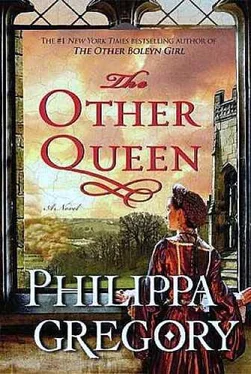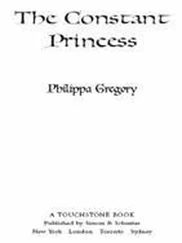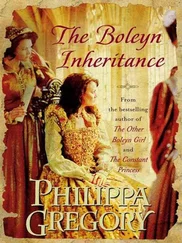I wait.
“What if next he decides thatI am a danger to the kingdom? What then? What if after me, he names you?”
I try to laugh. “He is hardly likely to accuse you, or me. We are the greatest men in England. I am the greatest landowner north of the Trent and you are the queen’s own cousin and a duke.”
“Yes. And that is why we are in danger. We are his rivals for power. He will destroy anyone who challenges him. Today the Queen of Scots faces his tribunal. Tomorrow it could be me, or any that have dared to challenge him: Percy, Dacre, Sussex, Arundel, Dudley, the Northern lords, you. He has to be stopped,” Howard says, his voice a low rumble in my ear. “Wouldn’t you stop him if you could?”
“It can’t be done,” I say cautiously. “The queen is free to choose her own advisors, and she trusts him like no other. He has been at her side since she was a young princess. What could we accuse him of?”
“Stealing Spanish gold! Pushing them to the brink of war! Making an enemy of France! Driving half the country towards treason with his constant suspicion and spying on people who want nothing more than to worship in the old way! Look at the court! Have you ever been at court before and felt yourself so fearful? It is filled with spies and plots.”
I nod. It is undeniable. Cecil’s fear of Papists and his hatred of foreigners stalk England.
“This last idiocy of his is the worst,” Howard says furiously. “That a ship should take refuge from bad weather in our port and be seized! He makes us a nation of pirates and the seas unsafe for our shipping.”
I can’t disagree. The Spanish treasure ship was blown into Plymouth expecting sanctuary, and Cecil, the son of a poor man, could not resist the gold it carried. He stole the gold—simple as that. And now the Spanish are threatening a blockade of trade, even war, if we do not pay it back. We are utterly in the wrong, all because Cecil is utterly in the wrong, but he has the ear of the Queen of England.
Howard masters his irritation with some difficulty. “Please God we never see the day when you come to me and say I was right to fear him and we should have defended ourselves, but now it is too late and one of our own is on trial for some trumped-up charge. Please God he does not pick us off one by one and we too trusting to defend ourselves.” He pauses. “His is a rule of terror. He makes us afraid of imaginary enemies so we don’t guard ourselves against him and against our government. We are so busy watching for foreigners that we forget to watch our friends. Anyway, you keep your counsel and I’ll keep mine. I’ll say no more against Cecil for now. You will keep this close? Not a word?”
The look he gives me persuades me, more than any argument. If the only duke in England, cousin to the queen herself, should fear his own words’ being reported to a man who should be little more than a royal servant, it proves that the servant has become overmighty. We are all growing afraid of Cecil’s knowledge, of Cecil’s network of intelligencers, of Cecil’s growing silent power.
“This is between the two of us,” I say quietly. I glance around to see that no one is in earshot. It is amazing to me that I, England’s greatest earl, and Howard, England’s only duke, should fear eavesdroppers. But so it is. This is what England has become in this tenth year of Elizabeth’s reign: a place where a man is afraid of his own shadow. And in these last ten years, my England seems to have filled with shadows.
1568, WINTER,
BOLTON CASTLE:
MARY
Irefuse, I utterly refuse to wear anything but my own gowns. My beautiful gowns, my furs, my fine lace collars, my velvets, my petticoats of cloth of gold were all left behind in Holyroodhouse, dusted with scented powder and hung in muslin bags in the wardrobe rooms. I wore armor when I rode out with Bothwell to teach my rebel lords a lesson, but it turned out I was neither teacher nor queen, for they beat me, arrested me, and hunted Bothwell down for an outlaw. They imprisoned me and I would have died in Lochleven Castle if I had not escaped by my own wits. Now, in England, they think I am brought so low as to wear hand-me-downs. They think I am sufficiently humbled to be glad of Elizabeth’s cast-off gowns.
They must be mad if they think that they can treat me as an ordinary woman. I am no ordinary woman. I am half divine. I have a place of my own, a unique place, between the angels and nobles. In heaven are God, Our Lady, and Her Son, and below them, like courtiers, the angels in their various degrees. On earth, as in heaven, there are the king, the queen, and princes; below them are nobles, gentry, working people, and paupers. At the very lowest, just above the beasts, are poor women: women without homes, husbands, or fortune.
And I? I am two things at once: the second-highest being in the world, a queen, and the very lowest: a woman without home, husband, or fortune. I am a queen three times over because I was born Queen of Scotland, daughter to King James V of Scotland, I was married to the Dauphin of France and inherited the French crown with him, and I am, in my own right, the only true and legitimate heir to the throne of England, being the great-grandniece to King Henry VIII of England, though his bastard daughter, Elizabeth, has usurped my place.
But,voilа! At the same time I am the lowest of all things, a poor woman without a husband to give her a name or protection, because my husband the King of France lived for no more than a year after our coronation, my kingdom of Scotland has mounted an evil rebellion against me and forced me out, and my claim to the throne of England is denied by the shameless red-haired bastard Elizabeth who sits in my place. I, who should be the greatest woman in Europe, am reduced so low that it is only her support that saved my life when the Scots rebels held me and threatened my execution, and it is her charity that houses me in England now.
I am only twenty-six years old and I have lived three lifetimes already! I deserve the highest place in the world and yet I occupy the lowest. But still I am a queen, I am a queen three times over. I was born Queen of Scotland, I was crowned Queen of France, and I am heir to the crown of England. Is it likely I will wear anything but ermine?
I tell my ladies-in-waiting, Mary Seton and Agnes Livingstone, that they can tell my hosts, Lord and Lady Scrope of Bolton Castle, that all my gowns, my favorite goods, and my personal furniture must be brought from Scotland at once and that I will wear nothing but my own beautiful clothes. I tell them that I will go in rags rather than wear anything but a queen’s wardrobe. I will crouch on the floorboards if I cannot sit on a throne under a cloth of estate.
It is a small victory for me as they hurry to obey me, and the great wagons come down the road from Edinburgh bringing my gowns, my bureaux, my linen, my silver, and my furniture, but I fear I have lost my jewels. The best of them, including my precious black pearls, have gone missing from my jewel chests. They are the finest pearls in Europe, a triple rope of matched rare black pearls; everyone knows they are mine. Who could be so wicked as to profit from my loss? Who would have the effrontery to wear a queen’s pearls robbed from her ransacked treasury? Who would sink so low as to want them, knowing they had been stolen from me when I was fighting for my life?
My half brother must have broken into my treasure room and stolen them. My false brother, who swore to be faithful, has betrayed me; my husband Bothwell, who swore he would win, is defeated. My son James, my most precious son, my baby, my only heir, whom I swore to protect, is in the hands of my enemies. We are all forsworn, we are all betrayers, we are all betrayed. And I—in one brilliant leap for freedom—am somehow caught again.
Читать дальше
Конец ознакомительного отрывка
Купить книгу












